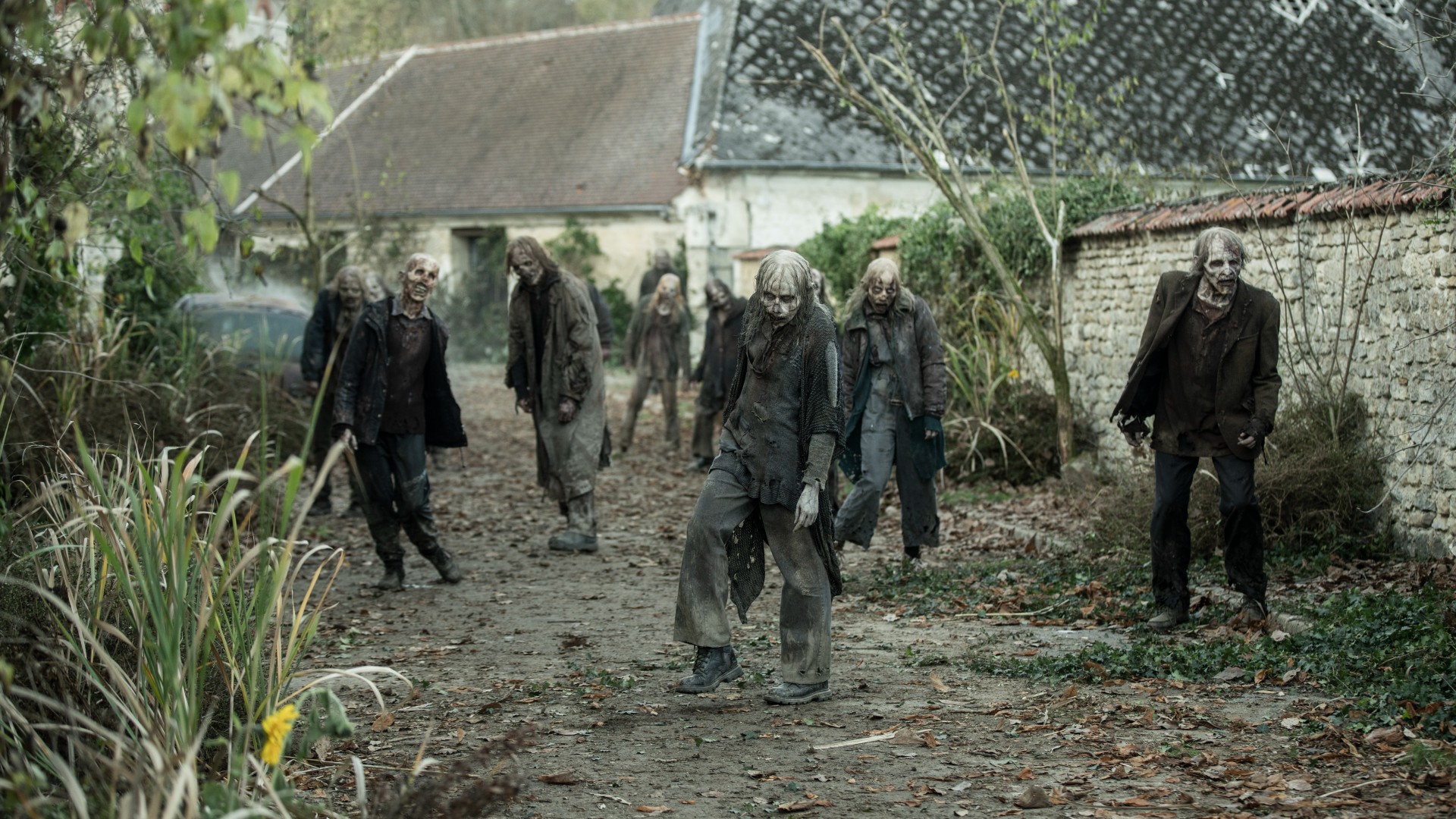This article contains spoilers for The Walking Dead: Daryl Dixon episode 1.
Through eleven seasons of The Walking Dead, the “rules” of the show’s reanimated walkers remained mostly the same.
Respecting the canon established in George A. Romero’s zombie films and Robert Kirkman’s comic source material, the undead on AMC’s long-running hit abided by the same rules. Walking Dead zombies were … 1. Re-animated corpses. 2. Slow-moving. 3. Hungry for flesh. 4. Could be dispatched only by a piercing wound to the brain.
That level of consistency helped establish The Walking Dead as one of the most successful shows of its era. But as they say, variety is the spice of (undead) life. In The Walking Dead‘s 11th and final season, the show finally opened the door for a different kind of zombie when Aaron (Ross Masquand) experienced the unimaginable horror of a walker that could … turn a doorknob!
Now, with the arrival of the Daryl Dixon-centric spinoff The Walking Dead: Daryl Dixon, the franchise is leveling up its zombies once again. This time with something a little more frightening than basically motor skills and spatial awareness.
There are hot zombies now! No, we don’t mean physically attractive zombies. The existence of those is purely between you and your hard drive. We mean like literally hot-to-the-touch walkers. Allow us to explain a little more about them and what they might mean for the TWD Universe going forward.
Daryl Dixon introduces these new so-called “burners” early on. Shortly after titular hero Daryl (Norman Reedus) mysteriously washes ashore on the coasts of France he stopes by a warehouse to re-up on supplies. While there he accidentally alerts his presence to a group of walkers. Normally this is something that Daryl would have no trouble handling but there’s something different about this crew of shamblers. When Daryl strikes the head of one zombie, it’s blood splatters on the floor and audibly sizzles as though it’s acidic. Then another walker grabs a hold of Daryl’s arm and thoroughly burns his flesh.
Later on, after Daryl is rendered unconscious in an unrelated skirmish, he wakes up in the convent led by Isabelle (Clémence Poésy). Isabelle explains that they had to cauterize Daryl’s burn wound as it’s the best way to “stop the spread,” suggesting that the zombie infection can proliferate via burned flesh now. She then goes on to say that her people call these specific kinds of walkers “boilers” or “burners.”
Unfortunately that’s all Isabelle and The Walking Dead at large have to say about this new iteration of zombie. There is no early indication where they come from, how they came to possess these high temperature traits, or how long France has been dealing with them. While we don’t know much about boilers themselves, however, we do know that The Walking Dead has been setting up the existence of “variant” zombies for several years now.
On the flagship series there were the aforementioned doorknob-turning zombies of season 11 but this could have just been an attempt from the show to wave away some curious zombie behavior from previous seasons. The pilot of The Walking Dead was written by then-showrunner Frank Darabont who didn’t seem as constrained to the rules of Kirkman’s source material as future showrunners would. As such, that episode features a notable instance of a zombie experiencing something vaguely resembling a memory and weakly manipulating the doorknob of her old home. Perhaps circling back to this instance was a way to lampshade the whole thing away – “Oh by the way, some zombies know doors. Deal with it.”
Anyone who has watched Walking Dead spinoff The Walking Dead: World Beyond though, knows that the truth of these new zombie mutations goes far deeper than that. In the final scene of that two-season show, viewers are presented with a scene set in a French laboratory. In that lab, it is suggested that the events that led to the zombie apocalypse may have originated in France. Good thing Daryl is there to investigate now.
In addition to that, the final scene also reveals that scientists across the world (including American Edwin Jenner of The Walking Dead season 1) were conducting research of “variant cohorts” of the undead virus. This suggests that whatever is causing this unholy reanimation may actually be mutating – leading to the creation of new kinds of monsters. That theory is all-but-confirmed by a French scientist dying and immediately reanimating as a zombie that’s far faster and more ferocious than anything we’ve seen before.
Zombie variants are very much part of The Walking Dead universe now and these “burners” are the most prominent example of them we’ve received yet. While we don’t yet know what causes their undead blood to boil, we do know that they’re joining a very proud tradition of hot and/or acidic zombies. Multiple forms of zombie media including Cataclysm: Dark Days Ahead, Left 4 Dead, and Dead Slate have featured zombies with similar properties.
One can only assume that, given at least 11 more seasons, we’ll get to see something akin to The Last of Us‘s mushroom zombies in this franchise as well.
New episodes of The Walking Dead: Daryl Dixon premiere Sundays at 9 p.m. ET on AMC.
